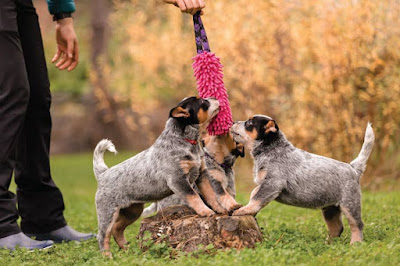Bringing a puppy home is among the most joyous experiences you can have. When a dog is brought home as a puppy, it needs to be fed, cared for, and taught, so they can thrive in their new environment. You might have heard of house training, wherein you teach your pup how to interact with various items and people in your household.
You might
also have heard of the term socialization; think of socialization as training
for the outside world. A properly socialized pup will be able to interact and
thrive in any circumstance or setting and become comfortable around a variety
of sights and smells. Doing so when a puppy is still young is crucial, as this
will help prepare them for the future and avoid behavioural issues further down
the road. Here are a few reasons why puppy socialization is important and how
you can socialize with your new best friend.
What is Puppy Socialization?
Socialization
is the process of learning to live and behave in a socially acceptable manner.
Puppy socialization is done for this purpose as well, to help them learn how to
function and participate in their respective social spheres. It is usually done
when a dog is still a pup, at around 3-12 weeks of age, as this is the period
where a pup’s brain can easily learn about the different sorts of interactions
in their daily life.
Early
socialization eases the acclimation process and helps your puppy become
comfortable in their day-to-day environment. During the socialization period, a
pet parent will try to expose their pup to multiple stimuli which will
familiarize their friend with several experiences, meeting people and animals
and getting to smell and see plenty. When done at an early stage, a puppy
becomes accustomed to its environment and grows into a healthy pet that is
well-adjusted to its environment.
Here are a few things a puppy can become comfortable with once socialized:
- People (both inside the household and out in the world)
- New sights and smells
- New objects
- Other dogs and new animals
- New materials and surfaces (Example: glass)
Why is it Important to Socialize My Puppy?
How Can I Socialize My Puppy?
Be sure to speak to your vet before beginning
the socialization process and avoid any stray dogs or other animals outdoors to
minimize the risk of diseases and unwanted pests (ticks, fleas, etc). Here are
a few tips on the socialization process and how to go about it.
- Preparing Your Puppy: Before you’re heading out, you should make sure you have a few basics such as a collar, harness, water, poop bags, wet wipes, and a mat.
- Positive Reinforcement: You should use positive reinforcement while socializing your pet to help build a positive relationship between your pet and your environment. You can reward your pet with love, affection, toys, or treats for positive interactions with their surroundings and environment.
- Be Slow & Steady with Stimuli: Puppies need to be introduced to stimuli gradually, otherwise they may feel anxious. When showing your puppy new sights, be sure to observe and watch out for their body language; looking away, ears being pulled back shaking, or whimpering are all signs of anxiety, and you should move your pup immediately if you observe them. Divert their attention with a treat or toy and wait for them to calm down. They do not need to be exposed to everything all at once, so the exposure should be brief and built upon gradually.
- Introduce Your Pup to People: Short and sweet interactions with people are a must during the socialization process. If you’re a family with children, then you’ll need to socialize your pup around children as well. Keep interactions short until your puppy is comfortable around people; do not let anyone pick up your puppy or make sudden movements with them, as it may scare your pup.
- Follow a Socialization Routine: Pets are creatures of habit. Therefore, you should follow a routine while you’re socializing your pet. fix up a routine and socialize your pet regularly throughout the week, roughly 2-4 times depending on your progress with the socialization process. Also, make sure to continue the socialization process as time goes on, as repetitive and continuous exposure to a variety of stimuli and situations is what will desensitize your dog and prevent behavioural regression as they age.
Tips on How to Socialize a Puppy
- Walk your puppy during mornings and evenings, through different scenery, settings, and localities (if possible).
- Walk your puppy on a variety of surfaces; Grass, gravel, dirt, sand, concrete, metal, and stone are some day-to-day surfaces, so it is useful to get them used to them early.
- Keep your puppy away from areas or localities where there are sick/unvaccinated/stray dogs. There is a risk of contracting infectious diseases, which should be minimized by avoiding them altogether.
- Avoid areas with heavy amounts of litter or pet waste such as dog walking trails, at least until your pet is fully vaccinated.
- Arrange social playtime with other healthy pet puppies.
- Introduce your puppy to people, both young and old.
- Negative reinforcement will only act as a setback, so move your puppy immediately if you notice your puppy's body language shift or if it appears scared.
Socialization is necessary to function in society, for both humans and pets. By making sure you socialize your pet early, you’re setting them up for a lifetime of comfort, whether at home, out and about in the neighbourhood, or when on a long journey when embarking on pet travel. Socializing is important because it will ensure your pup stays comfortable in any scene or setting; by providing it promptly, you'll ensure your pup is as comfortable as it can be in life.




No comments:
Post a Comment